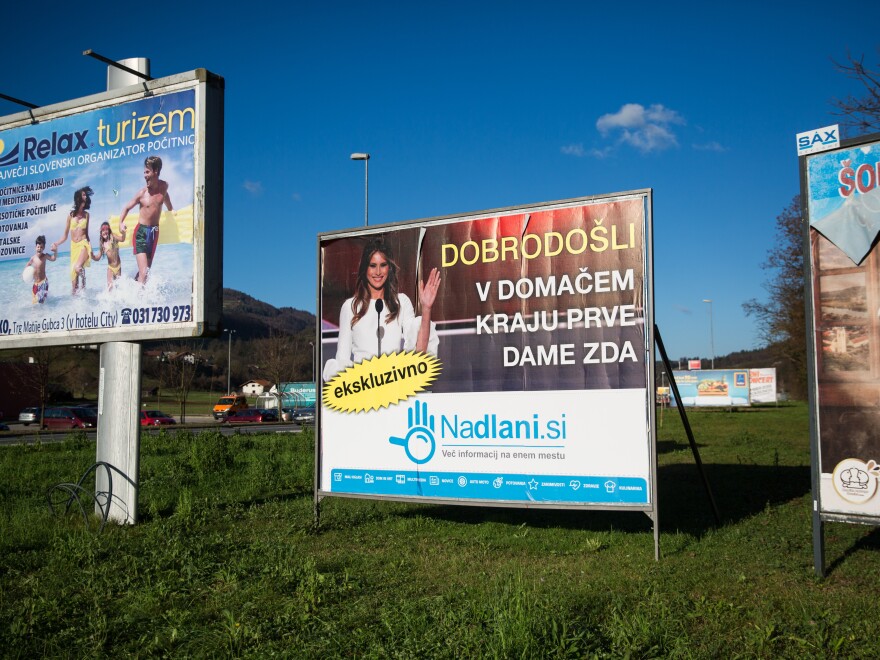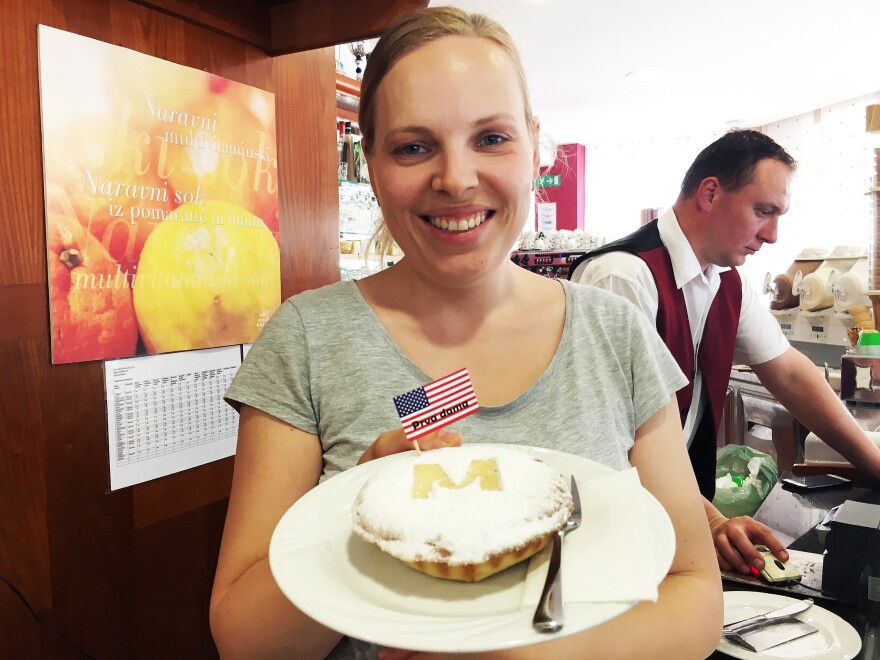The hamlet of Sevnica, population 5,000, sits right in the middle of the small, alpine nation of Slovenia, in a green valley along the Sava River, surrounded by pine-forested hills.
"It's really an amazing climate," chirps Lidija Ogorevc, a cheerleader-peppy tour guide here. "You should try our wine, our salami."
She stops in front of a fenced-in building — not unattractive, but clearly closed.
"A cultural monument," she declares.
This used to be the factory where Amalija Knavs, the mother of Melania Trump, designed children's clothes decades ago, when Slovenia was still part of Yugoslavia.

The first lady, born Melanija Knavs, is a native of Slovenia — which, to many Slovenians' frustration, is often confused with Slovakia, another tiny European country.
In Sevnica, where the first lady was raised, Ogorevc leads a tour that includes the first lady's elementary school, the Communist-era apartment block where she first lived and the neighborhood where her parents still own a handsome, two-story, black-roofed white house. (Viktor and Amalija Knavs are often in the U.S.)
The five-hour walking tour, which costs about $90 for two, is one of several Melania-themed tours offered by the Sevnica municipality.
"You see houses there?" Ogorevc says, waving her arm at a well-kept street of manicured lawns. "OK, that's the Beverly Hills of Sevnica. I say it like that because most people who have money can afford to build a house there."
Ogorevc takes us to a cafe offering Melanija torte (white chocolate mousse, nuts and edible gold) and a bakery with First Lady Apple Pie. "We wanted to do something that is a mix of America and Sevnica," says Maja Kozole Popadic, whose family owns the bakery.

The town's Kopitarna shoe store also sells "White House slippers" (powder-gray, with white pom-poms) for about $60 a pair.
"We made 300, and we've almost sold out of them now," says the slipper's designer, Maja Stamol. Residents and tourists alike are buying them, she says.
Demand for tours like the one Ogorevc leads has gone up by 30 percent since the beginning of the year, according to the municipality. That's a boon for a town that, until last year, was known mostly for its underwear factory and salami festival, says Mayor Srecko Ocvirk.
"A lot of people are coming from Europe, Japan, China and the U.S.," Ocvirk says. "From an anonymous little town, we are now on the world tourist map."
I meet him at Sevnica's hilltop castle, which dates to the early Middle Ages, and where an accordionist in lederhosen serenades a wedding party. The castle sells first lady-themed red wine, using blaufränkisch grapes from four local wineries; dark chocolate with walnuts and gold leaf; salami made from local Krskopoljc pigs and "non-toxic" teacups handmade by local potter Bozo Gligic Krmelj.
"Melania was raised here, she used to be our neighbor," the mayor says. "Yes, she's President Trump's wife, and that's what she's known for. But we want to focus only on her."
Melanija Knavs left Slovenia in the 1990s to pursue fashion modeling in the United States. She hasn't been back in more than a decade.
Last year, she hired Natasa Pirc Musar's law firm in the capital, Ljubljana, to go after tabloids in Slovenia publishing stories claiming she was an escort for older men.
"She is not going to tolerate lies," Musar said.
Musar also makes sure the first lady's photo and full name are not used in Melania-themed products, and that those products are appropriate.
"We would react heavily if someone is going to make an underwear called Melania Trump," Musar says. "She's a tolerant lady. She knows how to draw a line, where the border is, we discuss this. Until now, the reaction was not needed in a single case."

People in Sevnica are careful not to criticize the first lady or her husband.
The closest thing to a critique has come from restaurant owner Bruno Vidmar, who created a President's Burger, with a frizz of fried yellow cheese on top of the bun to represent Trump's hair and fiery pickles for his "hot statements."
At a cafe in Ljubljana, Natasa Briski, CEO of the digital media network Metina Lista, is more critical.
"I would like to Melania to be more active, more involved on issues other than maybe how well you dress and how good you look," Briski says.
And how, Briski asks, can Mrs. Trump tackle online bullying, an issue in which she's expressed interest, "when she has her hands full with her husband, the president of the United States, who is the troll of the Internet at this moment?"
Ivo Vajgl, a Slovenian member of the European Parliament, is not just put off by the president's Twitter feed.
"I wish [the] president would appreciate responsible and creative politicians, not just right-wing populists," he says with a sigh.
Slovenia, he says, has flourished because of help from the European Union, which Trump has slammed.
"I just hope his wrongdoing will be limited," Vajgl says. "That the world would not suffer because of his decisions. I think everyone in this country wishes [his wife] the best."
Slovenians loved it when the pope recently asked the first lady if she fed the president potica, Slovenia's rich, traditional nut cake.
Seizing on its newfound fame, Slovenia is planning to ask the EU to officially recognize the recipe.
Copyright 2024 NPR





